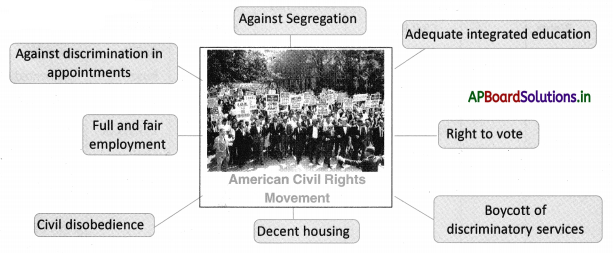Students can go through AP State Board 10th Class Social Studies Notes Chapter 21 Social Movements in Our Times to understand and remember the concept easily.
AP State Board Syllabus 10th Class Social Studies Notes Chapter 21 Social Movements in Our Times
→ From 1950, an era of economic growth and prosperity for most of the countries was started.
→ Likewise from 1950 tensions were grown in many countries and sections of societies that had long been denied equal rights.
→ The American Civil Rights Movement fought for equal treatment of Afro – Americans against permitting segregation.
→ They boycotted discriminatory services like buses and schools.
→ They violated discriminatory laws peacefully.
→ On 28th August 1963, they conducted Washington March.
→ They demanded the passing of the bill, decent housing, the right to vote, and adequate integrated education.
→ Malcolm X and others were of the view that blacks needed a separate nation.
→ The USSR and other countries of Eastern Europe governments were constantly under fear of conspiracies to destabilize them and kept close control over all activities of people.
![]()
→ The 1970s and 1980s saw a new kind of movement – the movement against war and nuclear arms.
→ Thousands of scientists and intellectuals from across the world campaigned for abolishing all nuclear weapons and insisted that the USA and the USSR come to an agreement to end the Arms Race.
→ There was large-scale human destruction in Vietnam when the USA and France fought with her.
→ A treaty was signed in 1991 called Strategic Arms Reduction Treaty (START) and removed 80% of all strategic nuclear weapons then in existence by 2001.
→ During the last phase of the USSR, a major accident took place in its nuclear plant in Chernobyl which caused the death of a large number of its workers.
→ Worldwide economic and political changes since the 1990s, which go by the name of ‘Globalisation’ or ‘Neo-liberalism’ have deeply impacted the lives of the underprivileged and poor.
→ Greenpeace has taken up the impact of climate change across many countries.
→ The worst industrial disaster in the world, claiming thousands of lives and many more suffering to date was happened in Bhopal in 1984.
→ In the beginning, people were awestruck by the dams, the huge amounts of water it could store, the vast tracts it could irrigate, the amount of electricity it could generate, the floods and droughts it could prevent.
→ Later people began to question even the dam constructed if it accounted for all the expenditure and all the losses incurred in terms of forests and fields and villages
→ Narmada Bachao Andolan that organized people’s movement in the Narmada Valley against the dam.
→ There were anti-arrack movements in combined Andhra Pradesh and the movement of Manipuri women against special powers of the armed forces, which were aimed at social justice and human rights.
![]()
→ Civil Rights: The equality of status between groups and races.
→ Civil disobedience ‘: The refusal to obey laws, pay taxes, etc.
→ Segregation: Keep one thing away from the other.
→ Destabilize: To make a system, country or government, etc. become less firmly established or successful.
→ AntIwar: The section of a society which does not support the war.:
→ Draft age: The period during which Black Americans awaited the Implementation of the Civil Rights Act.
→ Weaponlsatlon: Making things set for the use of weapons.
→ RehabilitatIon: HelpIng the people to restore normalcy after they are affected by the way
→ CompensatIon: Money that is given to. winning side by the lost side as they had hurt it.
→ AntI – arrack: The movement led by women belonged to the poorest Movement, a section of society in Andhra Pradesh to ban toddy and arrack and later complete prohibition.
→ Democratic: Controlled by representatives who are elected by the people of the country.
→ Participatory: Taking part in an activity ‘or event.
→ Fascism: The Ideology of Benito Mussolini, which encouraged militarism and extreme nationalism and opposed democracy and liberalism in Italy.
→ Liberalism: PolitIcal views favoring progress, reform, and Individual freedom.
→ National Liberation: Movement run to free a country from the control of the Movement other.
![]()
→ Score: A group of twenty.
→ Nazism: The Ideology of Adolf Hitler, which encouraged building armed forces, regaining territories lost and against communism, hatred towards Jews In Germany.
→ Laotians The people of Laos.
→ Napalm bombs: Petrol/gas bombs.
→ Cold War: The state of military tension and diplomatic and political hostility between the USA and the USSR.
→ Globalization: DIfferent economies around the world are becoming connected.
→ SustaInable: Development which Is environmentally sustainable over-development long time and also just for all people.
→ Green peace: Movement to ensure the ability of the earth to nurture life In movement all Its dIversity
→ SSP: SardarSarovar Project.
→ Multipurpose dams: The river valley projects which serve the main functions like the supply of Irrigation water, generation of power, control of floods, development navigation, and fishery are generally described as multipurpose dams.
→ Environmental: Movements for protection of the natural environment and movement sustainability of It.
![]()
→ Movements of Women: Movements taken up by women against unequal treatment for equal rights and opportunities, personal safety, and Justice.
→ Movement of Women: Movement of Manipur women against the misuse Manipurl of Armed Forces Special Power Act by Indian Parliament In Manipur after Its merger agreement.

